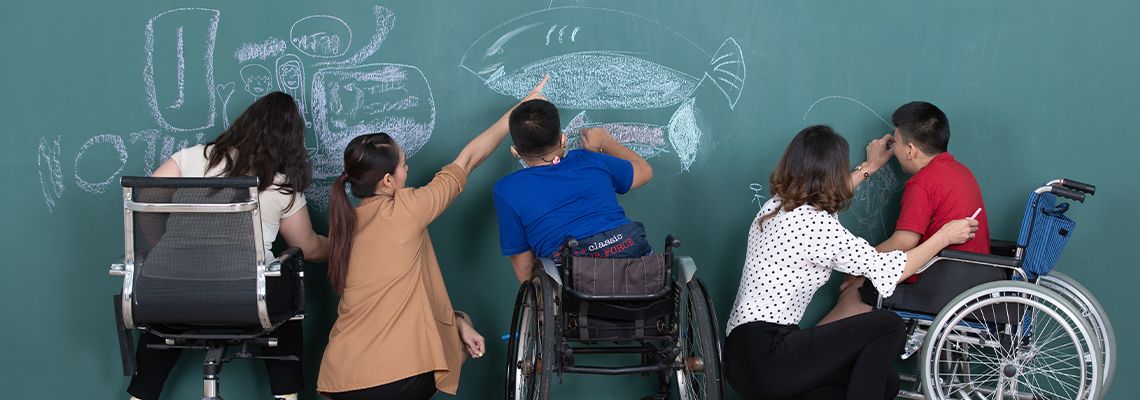Navigating the special education system can feel overwhelming and confusing for many families. Between complex laws, school meetings, and endless paperwork, it’s easy to feel lost — or worse, unheard. That’s where having the right support makes all the difference.
Your children come first. Connect with a special education attorney today.

The Rights of Students With Disabilities Under Texas Law
your Recognizing the rights of students with disabilities is essential for assuring equitable access to education. In Texas, various laws protect these students, aiming to provide the necessary support and services for them to thrive academically and socially.
In this article, I’ll explore the legal rights afforded to disabled students, covering both federal and state laws, as well as the processes for obtaining necessary supports and servcies. By understanding these rights, parents and guardians can effectively advocate for their children’s special education needs and make sure that they receive the support they deserve.
Federal Laws Protecting Students With Disabilities
Federal laws play a crucial role in safeguarding the rights of students with disabilities. The Individuals with Disabilities Education Act (IDEA) and Section 504 of the Rehabilitation Act are two key pieces of legislation that provide specific protections and services.
Individuals with Disabilities Education Act (IDEA): This federal law makes sure that children with disabilities have access to a free appropriate public education (FAPE). It mandates the development of an Individualized Education Program (IEP), outlining the specific educational goals and services required to support their learning.
Section 504 of the Rehabilitation Act: This law prohibits discrimination against individuals with disabilities in programs receiving federal financial assistance. Under Section 504, students with disabilities are entitled to reasonable accommodations and modifications to assure their equal access to education.
Both laws work in tandem to create a foundation for educational equity, making sure that students with disabilities aren’t only included but also provided with the necessary resources to succeed.
Texas Laws Supporting Students With Disabilities
Notably, Texas has its own laws that support students with disabilities. The Texas Education Code mandates that students receive a Free Appropriate Public Education (FAPE) tailored to their individual needs. Schools must develop Individualized Education Programs (IEPs) that outline the specific services and accommodations necessary to support each student’s learning.
Furthermore, Texas law emphasizes the importance of early intervention services for younger children with disabilities. These services aim to identify and address developmental delays as early as possible, setting the foundation for a more successful special education experience.
Rights to Non-Discrimination
Students with disabilities have the right to a learning environment free from discrimination. This principle is foundational to both federal and state laws and is essential for fostering an inclusive educational experience.
Equal access to educational opportunities: Schools must make sure that students with disabilities have equal access to all programs and activities. This includes not only academic courses but also extracurricular activities, sports, and other school events.
Reasonable accommodations: Students are entitled to receive reasonable accommodations that allow them to participate fully in the educational process. This may include modifications to the curriculum, assistive technology, or support services.
When schools fail to provide an environment free from discrimination, they violate the rights of students with disabilities. Families can take action by documenting instances of discrimination and working with school officials to address the issues.
Rights to Confidentiality
Students with disabilities have the right to confidentiality regarding their educational records. This means that information about their disabilities, evaluations, and special education plans should be kept private and only shared with authorized individuals. Establishing confidentiality helps protect the student's dignity and privacy within the school setting.
Parents should be aware of their rights to access their child's special education records and request corrections if necessary. Understanding these rights is essential for families to maintain control over their child’s personal information and educational journey.
Inclusion and Mainstreaming
Inclusion refers to the practice of educating students with disabilities alongside their non-disabled peers in general education settings. Texas law emphasizes the importance of educating students in their least restrictive environment (LRE), allowing them to benefit from the social and academic advantages of a mainstream classroom.
While inclusion is beneficial, appropriate supports and accommodations must be in place to ensure the success of students with disabilities in those environments. Collaborative efforts among educators, parents, and specialists are crucial for successful inclusion practices.
The Role of Parents and Guardians
Parents and guardians are crucial advocates for their children with disabilities. Their active participation in IEP meetings and collaboration with school staff can significantly influence the educational experience. By sharing their insights and concerns, parents help make sure that their child’s unique needs are effectively addressed in the educational setting.
Additionally, parents have the right to request evaluations, modifications, and reviews of their child’s IEP. This ability to advocate for necessary changes is vital, as students' needs may evolve over time. When parents stay engaged and informed, they can better support their child's special education journey and make sure that appropriate services are continually provided.
Processes for Addressing Violations of Rights
When rights are violated, families have several avenues for recourse. Understanding these processes can help parents take appropriate action to address issues that arise.
Filing complaints: Parents can file complaints with the school district or the Texas Education Agency if they believe their child's rights have been violated. This formal process allows families to bring attention to issues and seek resolution.
Mediation and due process hearings: If disputes can’t be resolved through informal channels, families may pursue mediation or request a due process hearing. These legal avenues provide an opportunity to resolve disagreements and make sure that students receive the services they need.
Being aware of these processes enables parents to take swift action when necessary, protecting their child's educational rights.
Importance of Documentation
Maintaining thorough documentation is essential for advocating for students with disabilities. Keeping detailed records of a child’s academic progress, communications with school officials, and the effectiveness of accommodations can provide valuable evidence during IEP meetings. This information helps to create a case for necessary adjustments to the educational plan.
In addition, documenting any challenges or successes related to a child’s education can help identify patterns that may require intervention. Regularly requesting and reviewing your child's educational record can enhance parents’ understanding of their child’s needs, facilitating more productive discussions with educators and making sure that appropriate supports are in place.
Understanding Transition Services
As students with disabilities approach graduation, they’re entitled to transition services that prepare them for post-secondary education, vocational training, or employment. Transition planning is a critical component of the IEP for students aged 14-16 and older.
Focus on life skills: Transition services should include goals that promote independence, such as life skills training and job readiness programs. These skills are essential for success after high school.
Collaboration with community resources: Engaging with community organizations can provide students with additional support and opportunities for skill development. This collaboration enhances the transition process, making sure that students are well-prepared for adulthood.
Transition planning is essential for helping students with disabilities handle the shift from school to independent living, making it a critical focus of their IEP.
Resources for Families
Numerous resources are available to assist families of students with disabilities. Local advocacy groups, educational consultants, and legal aid organizations can provide guidance and support throughout the IEP process. Connecting with these resources can empower families to make informed decisions and effectively advocate for their child’s rights.
Additionally, online platforms and community forums can offer valuable insights and shared experiences from other parents managing similar challenges. Utilizing these resources can help families feel less isolated and more equipped to tackle the intricacies of special education.
Reach Out Today
My firm in Katy, Texas, serves families across the entire state of Texas. I believe that staying informed about processes for addressing rights violations and the importance of documentation empowers parents in their advocacy efforts. Reach out to me, Attorney Jennifer Swanson, at Swanson Law, PLLC today for guidance and support.
RECENT POSTS
Helping students with disabilities achieve success in school takes more than strong teaching. It often requires a range of support systems, tools, and services designed to meet individual needs.



